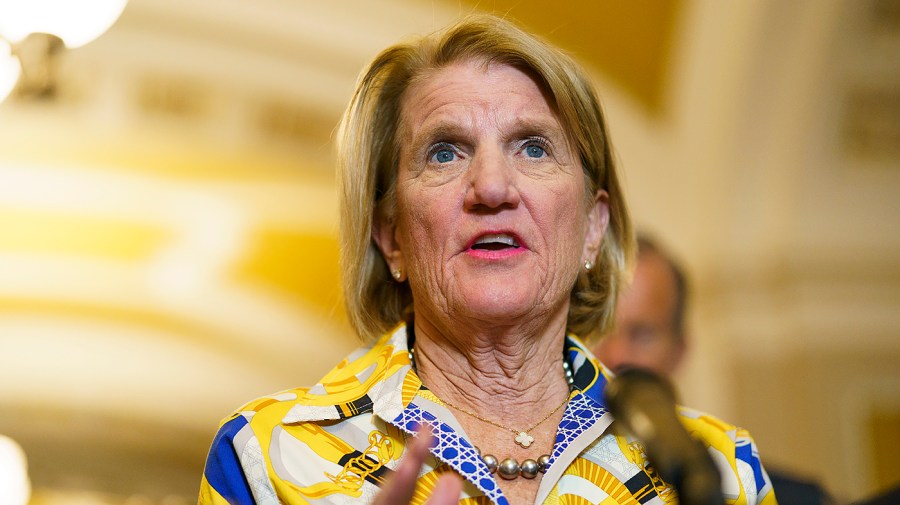Senate GOP fears House actions could lead to shutdown: ‘It’s going to be a problem’
Senate Republicans are worried the House GOP’s decision to write government funding bills at levels below those laid out in the recently passed bipartisan debt ceiling bill will create a tough road for lawmakers to avert a government shutdown.
House Republican leaders this week announced a plan to write 2024 spending bills at fiscal 2022 levels, an attempt to assuage House Freedom Caucus members who effectively shut down all work in the chamber last week over their dissatisfaction with the debt ceiling deal struck by Speaker Kevin McCarthy (R-Calif.) and President Biden.
The news outraged Democrats and landed like a thud with GOP appropriators in the Senate, leaving them to scramble to get a funding bill through Congress before the end of September.
“It’s going to be a problem,” Sen. Shelley Moore Capito (W.Va.), the No. 5 Senate Republican and an Appropriations Committee member, told The Hill. “I don’t want to co-opt what Sen. [Susan] Collins [R-Maine] might say, but … we struck an agreement that will write to those numbers.”
“We’ll go into a collaborative conference, try to hash it out,” Capito continued. “But I don’t think it’s going to be easy.”
More Senate coverage from The Hill
- Wyden opens ‘wide-ranging’ probe into PGA-LIV merger
- Cruz, Graham, Grassley join Democrats to advance journalism antitrust bill
- White House blasts Tuberville’s hold on military nominations
- Sen. Gillibrand introduces bill to protect older Americans in the workplace
The Senate has eight working weeks between now and the end of September before a spending deal is needed, with the annual monthlong August recess sandwiched in between.
In total, the decision to put the bills together at the 2022 levels would represent a $120 billion haircut that Democrats in both chambers and most Senate Republicans are not at all prepared to swallow.
A number of Senate Republicans were already upset that the debt ceiling agreement likely will not allow for an increase in defense spending in any 2024 funding deal, and the possibility of even greater cuts is making the road to an agreement even more treacherous than before.

Sen. Shelley Moore Capito (R-W.Va.) addresses reporters after the weekly policy luncheon on Wednesday, May 31, 2023. (Greg Nash)
“I’m not concerned that we lack the capacity to do it,” Sen. Bill Hagerty (R-Tenn.), a Senate Appropriations Committee member, told The Hill. “But we have to have the will to get on it.”
If there’s anything that makes some senators hopeful that they can reach a resolution, it’s the carrot and stick included in the debt ceiling deal. If a spending accord is not struck, a 1 percent cut across the board for defense and nondefense priorities would go into effect next year — a result almost no one in the upper chamber wants.
Senators on both sides of the aisle are warning the national security implications will be dire if the cuts take place.
“I think there’s an incentive for both sides to try and get to a deal even though it’s going to be really hard,” said Sen. John Thune (S.D.), the No. 2 Senate Republican. “Moving bills here is hard enough. It’s going to be really challenging I think in the House.”
McCarthy and House Republicans have attempted to assuage concerns that a shutdown may be the end result of their decision and have insisted they are adhering to the debt deal. The say the budget caps represent a ceiling, not a floor, meaning writing bills at 2022 numbers is reasonable.
Democrats could not disagree more. They note lawmakers generally look at spending caps as spending levels to aim for, not a number to come in under, and they believe McCarthy is “reneging” on his deal with the White House, according to Sen. Angus King (I-Maine).
“This is a big problem,” said Sen. Chris Van Hollen (D-Md.), a Senate appropriator. “This is obviously a bad start in the House because the ink was barely dry … before Speaker McCarthy ran away from the bargain he struck.”
“It seems pretty clear that Speaker McCarthy’s No. 1 priority is political survival and I think feels he has to cater to the far-right, MAGA crowd there,” Van Hollen continued. “It’s clearly going to make for some rocky moments over the next couple of [months].”
The gripes of Senate Democrats echo their House colleagues. House Minority Leader Hakeem Jeffries (D-N.Y.) said Democrats will oppose anything under the spending levels laid out in the debt ceiling deal.
“The Senate is going to mark up to the deal that was made. And so House Republicans are going to completely make themselves irrelevant [and] make their members vote on these deep, deep cuts, and it has no possibility of becoming law,” Rep. Pete Aguilar (Calif.), the chair of the House Democratic Caucus, told reporters Tuesday in the Capitol.
Sen. Patty Murray (D-Wash.), chair of the Senate Appropriations Committee, has already vowed to bring up the series of a dozen appropriations bills at the levels agreed to in the recently passed debt ceiling bill.
And some in the Senate are simply ignoring the House’s actions as lawmakers realize that any spending deal will have to move in a similar fashion to the debt ceiling deal, which drew conservative ire but ultimately passed in a bipartisan fashion.
“It doesn’t strike me as serious. … I don’t think it can pass the House and even if it does it definitely can’t pass the Senate,” said Sen. Brian Schatz (D-Hawaii), a Senate appropriator. “We’re going to have to do a bipartisan appropriations bill and they can start out with whatever partisan position they want, but this ain’t it.”
Copyright 2024 Nexstar Media Inc. All rights reserved. This material may not be published, broadcast, rewritten, or redistributed..















